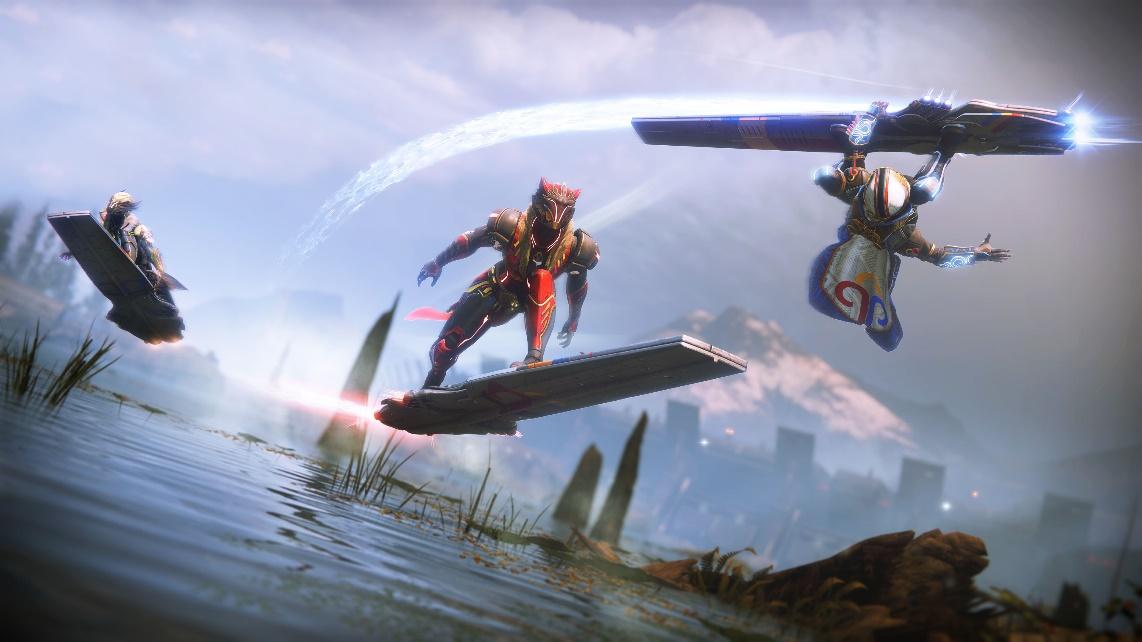Destiny 2's Guardian Games requires players to qualify in order to make store purchases
Destiny 2 continues to be the worst version of itself

Sign up to receive The Snapshot, a free special dispatch from Laptop Mag, in your inbox.
You are now subscribed
Your newsletter sign-up was successful
Destiny 2's Guardian Games All-Stars event has begun, which pits players against each other in a three-week competition. This year's event comes with new challenges and rewards, including Destiny 2's first hoverboard.
While that's all well and good, players looking to bring home the physical commemorative Guardian Games medal will need to qualify to make a purchase. Which seems counter-intuitive. Either a medal is something you achieve, or it's a piece of memorabilia that you buy. It shouldn't be both. Unfortunately, this is just another indication of how far Destiny 2 has fallen into the monetization trap.
A studio in trouble
Destiny has always been a live-service franchise, but the current free-to-play model with annual pass is no one's favorite iteration of Destiny 2. Granted, the original version of Destiny 2 was far from beloved as it was but at least that game felt a bit less like a sci-fi version of "Fortnite."
The constantly changing, but somehow always worsening, atmosphere of Destiny 2 is just a symptom of Bungie's troubled business history. After splitting from Microsoft in 2007, Bungie became an independent company but continued to work with Microsoft on the Halo franchise for another two games. In 2010, Bungie split from Microsoft entirely and entered a 10-year publishing agreement with Activision Blizzard which resulted in the original Destiny in 2014.
In 2018, Chinese game conglomerate NetEase purchased a minority stake in Bungie which included a seat on Bungie's board of directors. Bungie terminated their contract with Activision in 2019 after just eight years, and transitioned Destiny 2 from Activision Blizzard's Battle.net host to Steam. According to Bungie the amicable split was primarily caused by differing ideas of where to take the Destiny franchise. In 2022, Sony Interactive Entertainment purchased Bungie. While Bungie remains an independent subsidiary of Sony, the partnership was designed to bring Sony into the Live Service market. A business plan that hasn't exactly panned out for Sony, considering the death of Sony London Studios and Sony's other recent mass layoffs which have given us at least six games that will never see the light of day.
So Destiny 2 started its life cycle in 2017 under the Activision partnership, moved to a free-to-play system in 2019 as a self-published Bungie project, and has since continued under Bungie's current deal with Sony.
Monetization is not innovation
While live service games are not inherently evil, they are a format that's ripe for corporate greed. Very few games function under the live service model. In fact, the original Destiny may well be one of the few success stories. And even that success was dicey at first. Destiny didn't really take off until its third expansion, The Taken King managed to finally flesh out the gameplay loop in a way that felt satisfactory for players. But that was very much a case of being at the right place, at the right time and stumbling into success.
However, much like we mentioned in our review of Suicide Squad: Kill the Justice League, the live service model is unlikely to die any time soon. While various legal issues have blocked the loot box bonanza, battle passes and paid content will continue to plague players for quite some time. Sadly, the way to make a good live service game is never the way that makes a studio the most money.
So as long as live service continues to be a game model, we'll keep getting exploitative live service systems that will nickel and dime you out of your wallet over the course of its lifespan.
Sign up to receive The Snapshot, a free special dispatch from Laptop Mag, in your inbox.
MORE FROM LAPTOP MAG
- I bought Mario vs. Donkey Kong for an all-time low price of $29
- 3 ways Nvidia’s gaming handheld can improve on the Nvidia Shield Portable
- Helldivers 2 review: The most fun galactic war (Would you like to know more?)

A former lab gremlin for Tom's Guide, Laptop Mag, Tom's Hardware, and TechRadar; Madeline has escaped the labs to join Laptop Mag as a Staff Writer. With over a decade of experience writing about tech and gaming, she may actually know a thing or two. Sometimes. When she isn't writing about the latest laptops and AI software, Madeline likes to throw herself into the ocean as a PADI scuba diving instructor and underwater photography enthusiast.









